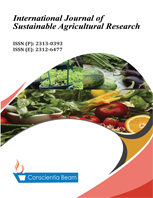Reducing Pratylenchus Population in Coffee Seedling with Mycorrhizal Fungi and Mycorrhiza Helper Bacteria
DOI:
https://doi.org/10.18488/ijsar.v9i3.3134Abstract
The attack of Pratylenchus coffeae nematode on coffee seedlings can limit coffee growth. The use of beneficial microbes as biofertilizer and bioprotectant is suggested to reduce the nematode attack on coffee seedlings and improve growth. A greenhouse experiment was conducted to observe the effect of arbuscular mycorrhizal fungi (AMF) Glomus spp. and mycorrhiza helper bacteria (MHB) P. diminuta and B. subtilis on coffee seedling growth and P. coffeae populations in the soil and roots. The experiment was set up in a randomized block design with five treatments and three replications. The coffee seedlings were grown in potting soil and inoculated with Glomus spp. combined with 20 g or 30 g of MHB solid inoculant. Seedlings were grown in the greenhouse for 10 weeks. The experiment verified that AMF inoculation combined with MHB did not affect the plant height, leaf number, or plant dry weight but decreased the P. coffeae population in the soil and roots of the seedlings. Inoculation of 20 g of MHB solid inoculant with AMF was more effective in reducing nematode population in soil and roots than 30 g of MHB. This experiment verified that Glomus spp., as well as P. diminuta and B. subtilis enable the control of P. coffeae in coffee seedlings.

